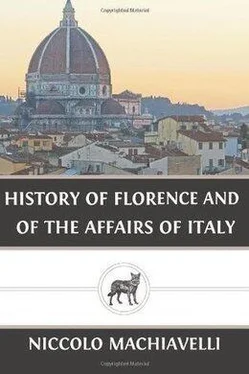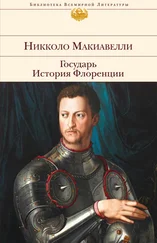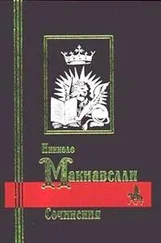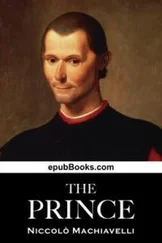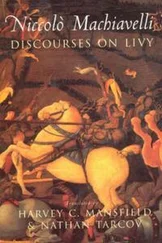In the meantime the Florentines proceeded slowly against Pietra Santa, and the enemy taking courage attacked and took their works upon the hill. This was effected with so much glory, and struck such a panic into the Florentines, that they were almost ready to raise the siege, and actually retreated a distance of four miles; for their generals thought that they would retire to winter quarters, it being now October, and make no further attempt till the return of spring.
When the discomfiture was known at Florence, the government was filled with indignation; and, to impart fresh vigor to the enterprise, and restore the reputation of their forces, they immediately appointed Antonio Pucci and Bernardo del Neri commissaries, who, with vast sums of money, proceeded to the army, and intimated the heavy displeasure of the Signory, and of the whole city, if they did not return to the walls; and what a disgrace, if so large an army and so many generals, having only a small garrison to contend with, could not conquer so poor and weak a place. They explained the immediate and future advantages that would result from the acquisition, and spoke so forcibly upon the subject, that all became anxious to renew the attack. They resolved, in the first place, to recover the rampart upon the hill; and here it was evident how greatly humanity, affability, and condescension influence the minds of soldiers; for Antonio Pucci, by encouraging one and promising another, shaking hands with this man and embracing that, induced them to proceed to the charge with such impetuosity, that they gained possession of the rampart in an instant. However, the victory was not unattended by misfortune, for Count Antonio da Marciano was killed by a cannon shot. This success filled the townspeople with so much terror, that they began to make proposals for capitulation; and to invest the surrender with imposing solemnity, Lorenzo de' Medici came to the camp, when, after a few days, the fortress was given up. It being now winter, the leaders of the expedition thought it unadvisable to make any further effort until the return of spring, more particularly because the autumnal air had been so unhealthy that numbers were affected by it. Antonio Pucci and Biongianni Gianfigliazzi were taken ill and died, to the great regret of all, so greatly had Antonio's conduct at Pietra Santa endeared him to the army.
Upon the taking of Pietra Santa, the Lucchese sent ambassadors to Florence, to demand its surrender to their republic, on account of its having previously belonged to them, and because, as they alleged, it was in the conditions that places taken by either party were to be restored to their original possessors. The Florentines did not deny the articles, but replied that they did not know whether, by the treaty between themselves and the Genoese, which was then under discussion, it would have to be given up or not, and therefore could not reply to that point at present; but in case of its restitution, it would first be necessary for the Lucchese to reimburse them for the expenses they had incurred and the injury they had suffered, in the death of so many citizens; and that when this was satisfactorily arranged, they might entertain hopes of obtaining the place.
The whole winter was consumed in negotiations between the Florentines and Genoese, which, by the pope's intervention, were carried on at Rome; but not being concluded upon the return of spring, the Florentines would have attacked Serezana had they not been prevented by the illness of Lorenzo de' Medici, and the war between the pope and King Ferrando; for Lorenzo was afflicted not only by the gout, which seemed hereditary in his family, but also by violent pains in the stomach, and was compelled to go the baths for relief.
The more important reason was furnished by the war, of which this was the origin. The city of L'Aquila, though subject to the kingdom of Naples, was in a manner free; and the Count di Montorio possessed great influence over it. The duke of Calabria was upon the banks of the Tronto with his men–at–arms, under pretense of appeasing some disturbances among the peasantry; but really with a design of reducing L'Aquila entirely under the king's authority, and sent for the Count di Montorio, as if to consult him upon the business he pretended then to have in hand. The count obeyed without the least suspicion, and on his arrival was made prisoner by the duke and sent to Naples. When this circumstance became known at L'Aquila, the anger of the inhabitants arose to the highest pitch; taking arms they killed Antonio Cencinello, commissary for the king, and with him some inhabitants known partisans of his majesty. The L'Aquilani, in order to have a defender in their rebellion, raised the banner of the church, and sent envoys to the pope, to submit their city and themselves to him, beseeching that he would defend them as his own subjects against the tyranny of the king. The pontiff gladly undertook their defense, for he had both public and private reasons for hating that monarch; and Signor Roberto of San Severino, an enemy of the duke of Milan, being disengaged, was appointed to take the command of his forces, and sent for with all speed to Rome. He entreated the friends and relatives of the Count di Montorio to withdraw their allegiance from the king, and induced the princes of Altimura, Salerno, and Bisignano to take arms against him. The king, finding himself so suddenly involved in war, had recourse to the Florentines and the duke of Milan for assistance. The Florentines hesitated with regard to their own conduct, for they felt all the inconvenience of neglecting their own affairs to attend to those of others, and hostilities against the church seemed likely to involve much risk. However, being under the obligation of a League, they preferred their honor to convenience or security, engaged the Orsini, and sent all their own forces under the Count di Pitigliano toward Rome, to the assistance of the king. The latter divided his forces into two parts; one, under the duke of Calabria, he sent toward Rome, which, being joined by the Florentines, opposed the army of the church; with the other, under his own command, he attacked the barons, and the war was prosecuted with various success on both sides. At length, the king, being universally victorious, peace was concluded by the intervention of the ambassadors of the king of Spain, in August, 1486, to which the pope consented; for having found fortune opposed to him he was not disposed to tempt it further. In this treaty all the powers of Italy were united, except the Genoese, who were omitted as rebels against the republic of Milan, and unjust occupiers of territories belonging to the Florentines. Upon the peace being ratified, Roberto da San Severino, having been during the war a treacherous ally of the church, and by no means formidable to her enemies, left Rome; being followed by the forces of the duke and the Florentines, after passing Cesena, found them near him, and urging his flight reached Ravenna with less than a hundred horse. Of his forces, part were received into the duke's service, and part were plundered by the peasantry. The king, being reconciled with his barons, put to death Jacopo Coppola and Antonello d'Aversa and their sons, for having, during the war, betrayed his secrets to the pope.
The pope becomes attached to the Florentines—The Genoese seize Serezanello—They are routed by the Florentines—Serezana surrenders—Genoa submits to the duke of Milan—War between the Venetians and the Dutch—Osimo revolts from the church—Count Girolamo Riario, lord of Furli, slain by a conspiracy—Galeotto, lord of Faenza, is murdered by the treachery of his wife—The government of the city offered to the Florentines—Disturbances in Sienna—Death of Lorenzo de' Medici—His eulogy—Establishment of his family—Estates bought by Lorenzo—His anxiety for the defense of Florence—His taste for arts and literature—The university of Pisa—The estimation of Lorenzo by other princes.
Читать дальше
